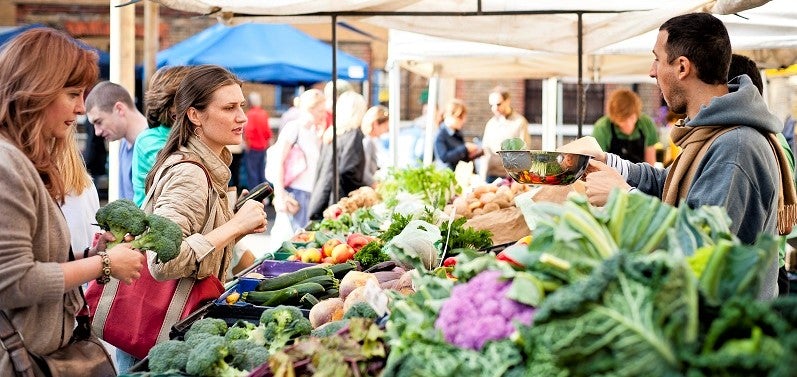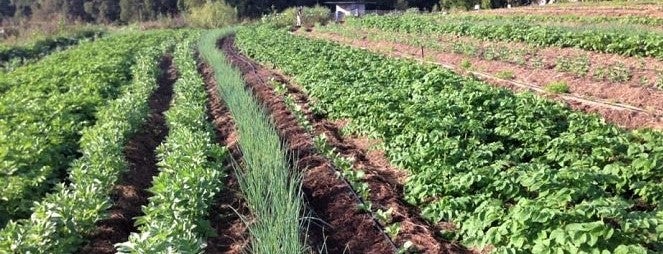The Rise of Organic Food on Restaurant Menus
One of the biggest food trends of recent years has been the marked shift toward organic produce, as restaurants begin to recognize the demand for a more sustainable diet. As a generation deeply concerned with the impact they are having on the environment, millennials are among the most eager consumers of organic food, believing that its greener production provides not only a safer product but a more flavorsome one as well. A major distinction between organic produce and other mass-produced foods is its lack of chemicals or pesticides, leading many consumers to regard the ‘cleaner’ foods produced from independent suppliers to eclipse those to have come from larger corporations.
The growing awareness of the damaging effects on the environment caused by the food industry is what has lately begun to push many towards expanding their tastes for more organic produce. According to a 2019 yearly revue by the National Restaurant Association, three quarters of restaurant owners reported noticeable levels of interest in organic menu offerings compared to those of just two years prior.
As such, numerous eateries, fast food businesses, and high-end restaurants are widening their product line up to incorporate a more diverse range of organic ingredients. Let’s break this trend down, then, and see why organic food is on the rise within restaurants all across the country.
Supporting local economy
A key characteristic of organic produce is that it does not usually travel very far, often finding its way from point of origin to the restaurant owner’s larder within the same state. This not only means that the food is much more likely to be as fresh as possible upon arrival - because it won’t have been put in any refrigerated storage facilities in making its way across the country - but there is a decent chance you will be familiar with the farm which supplied it. The most positive aspect of this is that your money will go back into the local economy, with kitchens both at home and in restaurants able to enjoy farm-fresh food items with all of the proceeds going back to the farm that provided it.
Unlike commercialized corporations, whose budgets exceed well beyond the costs of production – having to take into account into marketing and transportation fees, as their product is dispatched to far ends of the country or even into different hemispheres – you can be sure that your money will be going right back to the source when you buy organic produce. As increasingly sustainable food products become more readily available to a consumer base more invested in cutting down on deforestation and greenhouse gases, there continues to be broader education as to the benefit of eating organically. This means that the incentives behind buying food grown locally will ensure that it remains – pardon the pun – an evergreen food trend.
Lower risk of pesticides
To meet the demands of commercial food wholesale, many conventional farms will use pesticides to maximize their output and save time in dealing with the bugs and insects that regularly prey on crops. There are several health detriments attributed to intake of pesticides, ranging from headaches to much more severe ailments such as weakened immune systems, leukemia, and prostate cancer.
The risks are especially pronounced for pregnant women, who can pass on the ingested pesticide to their unborn child, and, in later life, through their milk when breastfeeding. Children are also vulnerable to exposure from pesticides, on account of their developing brains and weaker immune systems: possible effects can include autism, motor dysfunction, and other general delays in bodily or mental development. If for nothing else than your bodily wellbeing, going organic is the best choice in your diet.

Cutting down on carbon emissions
Food production represents one of the most damaging industries in the world, with huge amounts of water and other resources required to maintain grazing spaces for cattle and other animals that constitute a large part of the modern diet. The combined effects of deforestation and the significant volumes of methane produced by cattle have long created detrimental impacts on the environment. In fact, almost 15% of all greenhouse gases globally are caused by livestock, with approximately two thirds of that percentage caused by cows. With the growing awareness of how the production and continued demand for beef products is making such a negative impact on the environment, the recent surge of interest in plant-based meats is leading many restaurants to adopt more meat alternatives on their menus.
But apart from saving on carbon emissions produced by cattle, organic produce also accounts for fewer greenhouse gases caused by transportation in food trucks. By keeping produce within a confined geographical area, often working on a point-A-to-point-B basis with limited movement between storage facilities, food ordered from local farms relies less on warehouses and refrigerated storage units as it doesn’t need to be kept chilled for long cross-country journeys.
The estimated distance food travels from farmer to wholesaler in the US is a whopping 1,500 miles. If that wasn’t bad enough in itself, most food which travels such distances is picked while still unripe and artificially prepared for consumption with irradiation and other forms of ‘ripening’ which seem to be in-line with the experiments in genetic modification, attempting to create foodstuffs with longer shelf lives. Add in the fact that organic food will be more natural, more nutrient-laden, and more fresh thanks to the absence of preservatives that is pumped into other foods travelling far greater distances, and you can see how buying organic not only helps the environment but gives you a better dining experience at the same time.
With almost year-round sunshine, California is one of the most fertile states in the country, and its reputation for fresh, organic food is well-deserved. Thanks to the Mediterranean climate of the San Francisco Bay Area, the cooler, foggier climates of the coast, and the high temperatures of the Central Valley, there is a wide array of food available to cater to even the most adventurous tastes. At Buffalo Market, ourselves based in the Bay Area, we nurture strong, long-standing relationships with small-scale local farmers to give you the highest quality organic produce at the lowest rate. We believe in the farm-to-fork principle of cutting down on food transport journeys to ensure food is still fresh when we deliver it to your doorstep, while also reducing carbon emissions.
If you’re a restaurant owner looking to hop on the organic food trend today, we’re here to provide you with over 2,600 market-quality items at the most competitive prices. Take a look at the ripe, succulent organic produce we’re bringing you wholesale and see how you can bring your customers into a new dimension of flavor and freshness.


